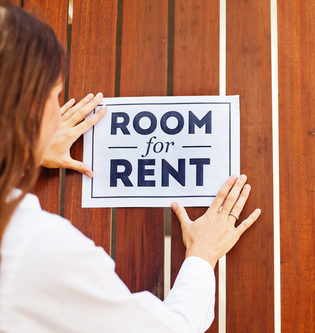
Imagine going through all the trouble of marketing, properly screening tenants, and signing leasing documents, only to discover unwelcome occupants in your rental property. As a landlord, understanding who a tenant is, who is a guest, and who is an unauthorized occupant is essential. Furthermore, knowing your rights as a landlord can help deal with an unfortunate and potentially detrimental situation. Continue reading below as we define common types of unauthorized tenants and outline what to do when discovered.
 Types of Unauthorized Tenants
Types of Unauthorized Tenants
- Tenant – An authorized tenant is the person of legal age who the owner screened and signed the lease with. These individuals or individuals are the ones who pay rent and occupy the landlord’s property.
- Authorized Occupant – Since the lease is a legal contract, tenants must be over 18. However, in the case of a family or some other circumstances, there may be additional occupants. Therefore, anyone under the age of 18 or unable to legally sign but is still expected to occupy the property along with the tenant is listed as an occupant in the lease.
- Subletter – Subletting refers to when someone else is added to an existing lease. Typically, this occurs behind the landlord’s back, meaning they do not have the opportunity to screen the subletter. If the current tenant needs to move but does not want to pay the penalties of a lease break, they may opt to circumvent the landlord and move in someone to take over the lease.
- Extended Guest – Landlords cannot refuse tenants the right to have visitors. That said, when family or friends come for an extended visit, tenants should inform the landlords. However, if the lessee has a long-term guest (over the age of 18) that contributes to the rent, this is an unauthorized occupant.
- Squatter – A squatter is an unauthorized individual who refuses to leave the unit. Depending on the circumstances, this may be due to a break-in with the individual deciding to take up residence. Additionally, “holding over” is a common problem for landlords. Thus, if the existing tenant’s lease expires and refuses to vacate, they become a squatter.
Why are Types of Unauthorized Tenants a Problem for Landlords?
Discovering types of unauthorized tenants in your rental property is alarming for landlords. These tenants present a problem because they were never on the lease or no longer had a current lease. That said, there are several concerns in these situations that make it an urgent matter. Read on for a few risks of unauthorized occupants.
- Nonexistent or Unenforceable Lease – When a tenant signs the lease, they are bound to uphold its terms and conditions. However, unauthorized occupants or guests do not know and thus, do not have to follow the rules for your property. That said, this also includes other rules the occupant may not be aware of, such as HOA policies and parking violations. All of which cause added stress for the landlords with few options to remedy the situation.
- Added Risk of Property Damage – Legal tenants are held accountable for their visitor’s actions. Generally, a tenant’s renters’ insurance may cover damage beyond the security deposit amount. However, it may be difficult to hold different types of unauthorized tenants responsible.
- Lack of Rent Payments – Unauthorized occupants are not on a lease and, therefore, not legally obligated to pay rent. So, when these types of unauthorized tenants take up residence, they are likely not paying rent. Moreover, the process to evict them can be lengthy and expensive. Therefore, landlords will continue to lose money as they go through the eviction proceedings.
When Does an Extended Guest Become a Tenant?
When it comes to different types of unauthorized tenants and guests, each state may have varying laws regarding becoming a true tenant. Typically, this is determined by the length of stay. In general, if a guest stays more than 2 weeks within a 6-month period, they should be added to the lease agreement. That said, length of stay is not the only factor involved in distinguishing guests and tenants. Some of the other telltale signs of a guest transitioning to a tenant include –

- Moving in Items – One of the first telltale signs beyond length and consistency of stay is when a guest starts moving in items. That said, this could be furniture, personal items, or even a pet. This means the guest could view the unit as their home.
- Accepting Mail – In general, a visiting guest is not otherwise associated with the address. If, however, the individual begins receiving mail or packages to the address, this is a red flag for landlords. In addition, mailing addresses are often used as a form of residency identification. Therefore, receiving mail at the location could indicate evidence of occupancy.
How to Address Types of Unauthorized Tenants in the Lease
Regardless of the individual, types of unauthorized tenants present a litany of problems for landlords. When it comes to preventing them, the best course of action is a clear and legally documented guest policy. To create an effective policy, property owners must address the following questions –
- What defines an authorized guest? – A guest policy must clearly define who is a guest and when an extended guest requires landlord approval. In general, friends, family, or acquaintances stay for only a short time. However, if any guest plans on staying for an extended period, such as an elderly family member needing care or a college student returning home for the summer – the landlord needs to be informed.
- How many guests are allowed in the home? – When deciding who is a guest and when extended guests are tenants, the timeframe is the key. So, in an effective guest policy, state the maximum timeframe a guest can stay without notifying the landlord. However, before deciding a timeframe you are comfortable with, check local laws for additional or specific restrictions.
- What is the Occupancy Limit? – In addition to who and when someone is considered a guest, how many guests is an important distinction. Any extended guests in the home should not violate occupancy standards which typically state no more than 2 persons per bedroom. In some cases, local laws base occupancy on square footage, so be sure to check local regulations before creating your guest policy.
How to Handle Unauthorized Occupants
Unfortunately, landlords must sometimes deal with unauthorized occupants. Even with proper tenant screening and a well-written lease, issues still arise. So, as well as having safeguards in place, landlords should follow the steps below to take quick action in dealing with unauthorized occupants.
- Make Contact with the Tenant – Sometimes, the tenant just needs a simple reminder of the lease guest policy. Ideally, this is all that is needed to remedy long-term guests in your rental property. Talking with the tenant lets owners convey expectations and gather further information on who the occupants are and how long they intend to stay. Take this opportunity to inform the tenants that allowing extended guests without landlord approval is a violation of the lease you intend to enforce.
- Send a Notice to Fix or Quit – In some cases, talking will not resolve the issue. Also, in the case of a break-in or squatter, it may be unsafe to approach the individual. So, the next step is to send a 3-Day notice to fix or quit. This notice informs the occupant that they must vacate the premises or face formal eviction.
- Evict the Occupant – Ideally, they vacate once they receive notice. If not, continue gathering evidence that can help present your case in court. During the formal eviction process, a judge will review both sides and issue orders to force the occupant out.
The Best Way to Handle Any Tenant
The best way to handle all types of unauthorized tenants, excessive guests, or legal tenants is through qualified property management. All landlords should familiarize themselves with local laws and restrictions regarding tenant guest policies. However, property managers offer added expertise in creating legal policies, screening applicants, and enforcing rules on behalf of the owner.

At Bay Property Management Group, our team understands the many risks unauthorized occupants present. We actively work to prevent these individuals from taking up residence but also have an effective eviction process in place just in case. So if you are a property owner dealing with long-term guests, squatters, or holdover tenants, give us a call today to see how professional management can help get control of your property back.

 Types of Unauthorized Tenants
Types of Unauthorized Tenants